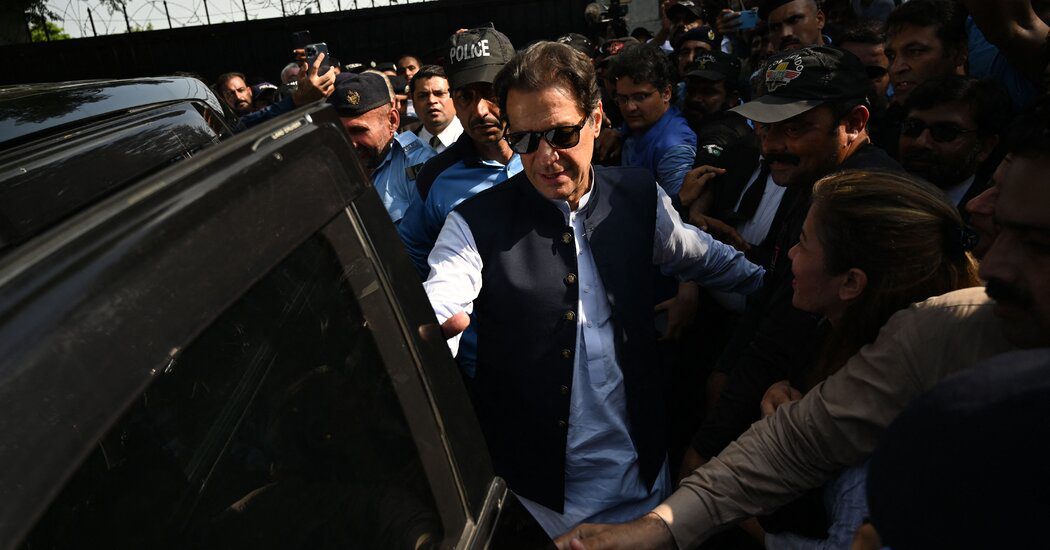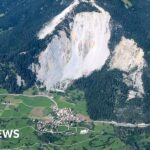Global Courant 2023-05-09 22:15:35
Pakistan’s ousted Prime Minister Imran Khan was arrested Tuesday on corruption charges, in a major escalation of a political crisis that has engulfed the country over the past year, raising the prospect of mass unrest among his supporters.
The arrest intensified a confrontation between the powerful Pakistani army and Mr Khan, taking the country into uncharted political territory. While Pakistani leaders have been arrested before, never before has Khan like him challenged so directly – and with massive popular support – the military, which has been the invisible force behind the government for decades.
Political tensions have been escalating for months as Mr Khan, a populist former cricket star who was removed from office last year, accused the army and the current government of conspiring against him. Both military and government officials deny those claims.
Mr Khan was at a hearing in Islamabad when he was arrested by paramilitary forces, and he remained in custody on Tuesday, officials said. A video of the arrest, circulating on social media, shows Mr. Khan is led in a police vehicle, surrounded by a crowd of security officers in riot gear. Mr Khan was arrested in connection with a land transfer for a university, officials said – one of several corruption cases he faces.
His political party called for demonstrations shortly after his arrest and protests broke out in several cities.
In Lahore, crowds of supporters of Mr. Khan the official residence of an army commander. Hundreds of protesters also gathered outside the army headquarters in Rawalpindi, just outside Islamabad. And in the port city of Karachi, police fired tear gas to disperse crowds blocking the city’s main road, and protesters set fire to a police car, a prison van and a paramilitary checkpoint.
The unrest was a stark reminder of the turbulent political scene in Pakistan, a nuclear-armed nation of 230 million that has struggled with instability and military coups since its founding 75 years ago. The military has ruled for more than half that history, and even under civilian governments, military leaders are seen as the force responsible for ushering in and deposing political dynasties.
Mr Khan – whose party commands considerable loyalty across the country – has made a stunning political comeback in the wake of his ouster last year. Tens of thousands have thronged his rallies, where Mr Khan and others have called for new elections and accused Pakistan’s military establishment of orchestrating his impeachment.
Prosecutors have opened dozens of lawsuits against Mr Khan in recent months, including on terrorism and corruption charges, and he has been repeatedly threatened with arrest after failing to appear in court.
Mr Khan and his supporters deny the allegations, characterizing them as an abuse of the justice system by the government, led by Prime Minister Shahbaz Sharif, and the military to keep him out of politics. Political and military leaders deny those claims.
Tensions around Mr Khan erupted in violence in November when he was wounded at a rally after an unidentified man opened fire on his convoy in what aides called an assassination attempt. In recent months, Mr. Khan accused a senior intelligence official of having played a role in that shooting.
On Monday, military officials sharply rebuked these allegations, issuing a statement saying that Khan had attacked military and intelligence officials with “innuendo and sensationalist propaganda” to further his political agenda.
The press release, a rare public statement from the military leaders to a political leader, underlined the seriousness of the clash between them and Mr Khan.
His arrest is “about Khan crossing the military’s ‘red line’ with his recent remarks against military and intelligence officials,” said Madiha Afzal, a fellow at the Brookings Institution. “It’s about Khan’s escalating confrontation with the military establishment over the past year, and the latter’s view of Khan as an existential threat.”
Mr Khan was arrested in connection with a land transfer case for Al-Qadir University, near Islamabad, officials said. Mr Khan is accused of doing favors to Malik Riaz Hussain, a powerful real estate tycoon, with the university receiving land and donations in return.
The National Accountability Bureau, Pakistan’s anti-corruption agency, said it had sent multiple notices to Mr Khan that were ignored. Officials said he is now being held at one of the agency’s offices in Rawalpindi, northern Pakistan.
He will be led before a court on Wednesday, officials said.
The drama surrounding Mr Khan seems to have only boosted his popularity, analysts say, highlighting his ability to outsmart Pakistan’s typical playbook for sidelining leaders who have fallen out of favor with the military.
Over the summer, his party, Pakistan Tehreek-e-Insaf, or PTI, won landslide victories in local elections in Punjab – a province that has often served as a gauge of national politics – and in Karachi.
Those victories were also seen as a response to deteriorating economic conditions that the government has struggled to address, and a rejection of the military establishment
But they have cracked down on Mr. Khan, seen by many as a concerted effort by the authorities to dampen his political prospects.
Journalists known to sympathize with Mr Khan say they have been harassed by authorities. Live broadcasts of his speeches have been banned from news networks. A mainstream channel, ARY News, was taken off the air after airing an interview with one of Mr. Khan in which he made anti-military remarks.
The crisis has flipped the script for Mr Khan, who benefited from a close relationship with the military when he was elected prime minister in 2018. At the time, his rivals claimed that the authorities had waged a campaign of coercion and intimidation that crushed any opposition and ensured Mr Khan’s success.
Military officials have denied those allegations, claiming that the institution has taken a “neutral” stance in the current political crisis. The military appeared to be withdrawing its support for Mr Khan early last year, paving the way for lawmakers in parliament to remove him with the vote of no confidence.
But Mr Khan has maintained widespread popularity, a sign that the authorities’ traditional methods may not be enough to silence a populist politician in the age of social media, analysts say.
Many now fear that Mr Khan’s arrest will exacerbate the unrest that has plagued the country in recent months. Before Tuesday, his aides warned that his detention would cause mass unrest.
“His supporters have shown themselves capable of showing up in large numbers and bringing life to a standstill,” said Zahid Hussain, an Islamabad-based political analyst and author.
Shortly after the arrest, official social media accounts of Mr Khan’s political party released a pre-recorded message from Mr Khan, urging party workers to protest across the country following his arrest.
Many backed that call on Tuesday and protests are expected to continue this week – raising the specter of possible violent clashes between police and Mr Khan’s supporters.
“We are not afraid of tear gas and batons,” said Muhammad Shafiq, a 24-year-old student who was one of the protesters in Karachi. “There is nothing more important to us than Mr. Khan.”
Zia ur-Rehman contributed reporting.




